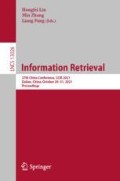Abstract
People usually believe that using pre-trained word vectors or pre-trained language models can effectively improve task performance. But that is not the case. A sufficient amount of annotated data is usually required to fine-tune the pre-trained language model and pre-trained word vectors for downstream tasks. In addition, the relevance of the training corpus and task corpus also affects task performance to a large extent. In this paper, we systematically compared the effects of different types of pre-trained embeddings and self-training embeddings on the performance of AES. At the same time, we propose an effective solution to the above problem, an automatic essay scoring method that includes pre-trained and self-training word embeddings. We conducted experiments on a public available dataset, including 8 subsets, and the experimental results show the effectiveness of this method.
Access this chapter
Tax calculation will be finalised at checkout
Purchases are for personal use only
References
Alikaniotis, D., Yannakoudakis, H., Rei, M.: Automatic text scoring using neural networks. arXiv preprint arXiv:1606.04289 (2016)
Chen, H., Xu, J., He, B.: Automated essay scoring by capturing relative writing quality. Comput. J. 57(9), 1318–1330 (2014)
Chen, M., Li, X.: Relevance-based automated essay scoring via hierarchical recurrent model. In: 2018 International Conference on Asian Language Processing (IALP), pp. 378–383. IEEE (2018)
Chen, Y.Y., Liu, C.L., Lee, C.H., Chang, T.H., et al.: An unsupervised automated essay-scoring system. IEEE Intell. Syst. 25(5), 61–67 (2010)
Clark, K., Luong, M.T., Le, Q.V., Manning, C.D.: Electra: pre-training text encoders as discriminators rather than generators. arXiv preprint arXiv:2003.10555 (2020)
Dong, F., Zhang, Y., Yang, J.: Attention-based recurrent convolutional neural network for automatic essay scoring. In: Proceedings of the 21st Conference on Computational Natural Language Learning (CoNLL 2017), pp. 153–162 (2017)
Kai, H.: Research and implementation of key techniques of English automatic essay scoring. Ph.D. thesis, Central China Normal University
Li, X., Chen, M., Nie, J.Y.: SEDNN: shared and enhanced deep neural network model for cross-prompt automated essay scoring. Knowl.-Based Syst. 210, 106491 (2020)
Liang, M., Wen, Q.: A critical review and implications of some automated essay scoring systems. Technol. Enhanced Foreign Lang. Educ. (5), 18–24 (2007)
Liqing, Y.: Research and implementation of automatic scoring system for English propositional essay. Ph.D. thesis, Central China Normal University (2019)
Liu, J., Xu, Y., Zhu, Y.: Automated essay scoring based on two-stage learning. arXiv preprint arXiv:1901.07744 (2019)
Ming, Z., Yan-ming, J., Cai-lan, Z., Ning, X.: English automated essay scoring methods based on discourse structure. Comput. Sci. 46(03), 240–247 (2019)
Ormerod, C.M., Malhotra, A., Jafari, A.: Automated essay scoring using efficient transformer-based language models. arXiv preprint arXiv:2102.13136 (2021)
Page, E.B.: Grading essays by computer: progress report. In: Proceedings of the Invitational Conference on Testing Problems (1967)
Pennington, J., Socher, R., Manning, C.D.: Glove: global vectors for word representation. In: Proceedings of the 2014 Conference on Empirical Methods in Natural Language Processing (EMNLP), pp. 1532–1543 (2014)
Pramukantoro, E.S., Fauzi, M.A.: Comparative analysis of string similarity and corpus-based similarity for automatic essay scoring system on e-learning gamification. In: 2016 International Conference on Advanced Computer Science and Information Systems (ICACSIS), pp. 149–155. IEEE (2016)
Rodriguez, P.U., Jafari, A., Ormerod, C.M.: Language models and automated essay scoring. arXiv preprint arXiv:1909.09482 (2019)
Ruixue, Z.: Study on automatic English composition scoring based on word vector clustering and random forest. Microcomput. Appl. 36(326(06)), 108–111 (2020)
Sun, Z., Yu, H., Song, X., Liu, R., Yang, Y., Zhou, D.: MobileBERT: a compact task-agnostic BERT for resource-limited devices. arXiv preprint arXiv:2004.02984 (2020)
Taghipour, K., Ng, H.T.: A neural approach to automated essay scoring. In: Proceedings of the 2016 Conference on Empirical Methods in Natural Language Processing, pp. 1882–1891 (2016)
Tay, Y., Phan, M., Tuan, L.A., Hui, S.C.: SkipFlow: incorporating neural coherence features for end-to-end automatic text scoring. In: Proceedings of the AAAI Conference on Artificial Intelligence, vol. 32 (2018)
Uto, M., Okano, M.: Robust neural automated essay scoring using item response theory. In: Bittencourt, I.I., Cukurova, M., Muldner, K., Luckin, R., Millán, E. (eds.) AIED 2020. LNCS (LNAI), vol. 12163, pp. 549–561. Springer, Cham (2020). https://doi.org/10.1007/978-3-030-52237-7_44
Vaswani, A., et al.: Attention is all you need. arXiv preprint arXiv:1706.03762 (2017)
Xianbing1, Z., Xiaochao, F., Ge, R., Yong, Y.: English automated essay scoring methods based on multilevel semantic features. Comput. Appl., 1–8 (2021)
Yannakoudakis, H., Briscoe, T., Medlock, B.: A new dataset and method for automatically grading ESOL texts. In: Proceedings of the 49th Annual Meeting of the Association for Computational Linguistics: Human Language Technologies, pp. 180–189 (2011)
Acknowledgments
This work was supported by grant from the Xinjiang Uygur Autonomous Region Natural Science Foundation Project No. 2021D01B72. This work was also supported by the Natural Science Foundation of China No. 62066044.
Author information
Authors and Affiliations
Corresponding author
Editor information
Editors and Affiliations
Rights and permissions
Copyright information
© 2021 Springer Nature Switzerland AG
About this paper
Cite this paper
Zhou, X., Yang, L., Fan, X., Ren, G., Yang, Y., Lin, H. (2021). Self-training vs Pre-trained Embeddings for Automatic Essay Scoring. In: Lin, H., Zhang, M., Pang, L. (eds) Information Retrieval. CCIR 2021. Lecture Notes in Computer Science(), vol 13026. Springer, Cham. https://doi.org/10.1007/978-3-030-88189-4_12
Download citation
DOI: https://doi.org/10.1007/978-3-030-88189-4_12
Published:
Publisher Name: Springer, Cham
Print ISBN: 978-3-030-88188-7
Online ISBN: 978-3-030-88189-4
eBook Packages: Computer ScienceComputer Science (R0)

